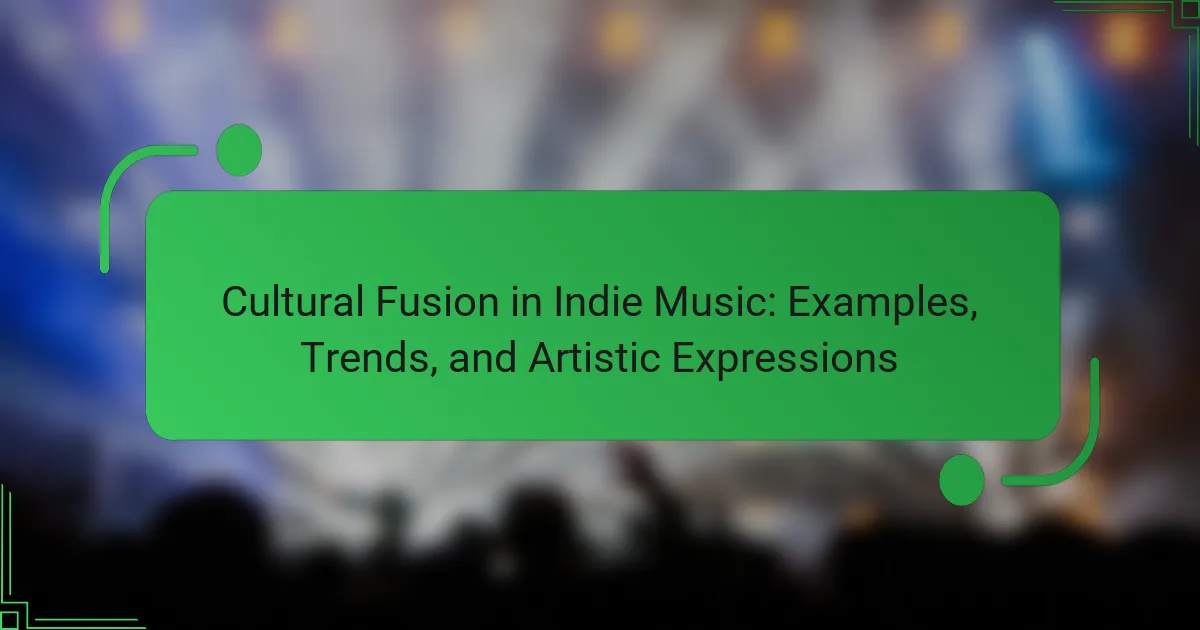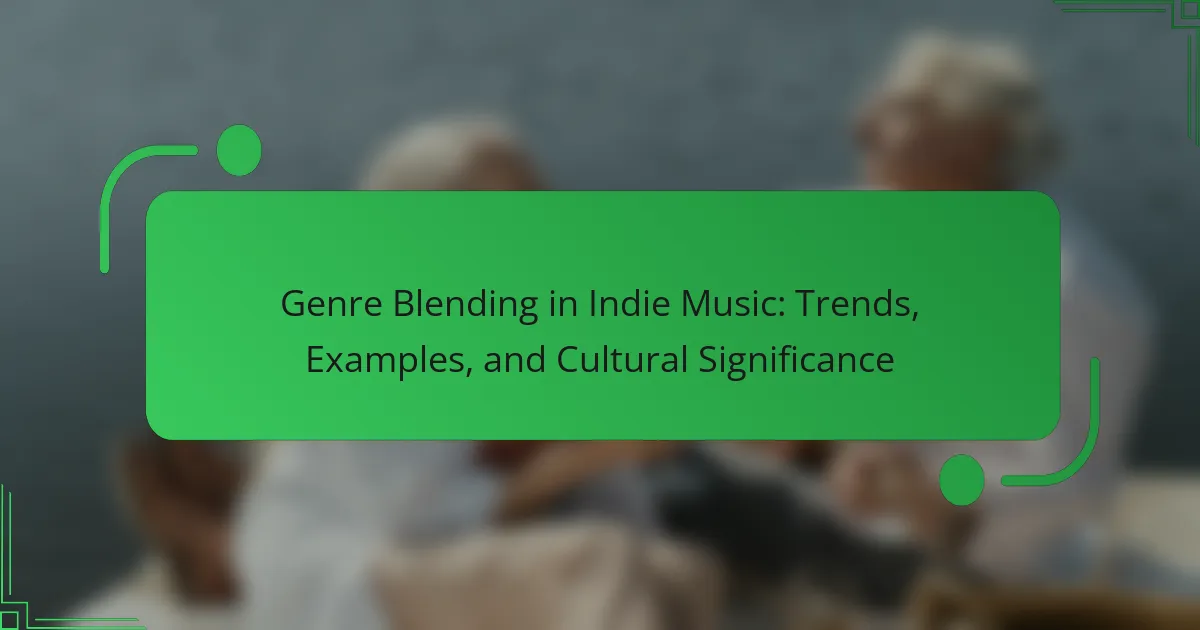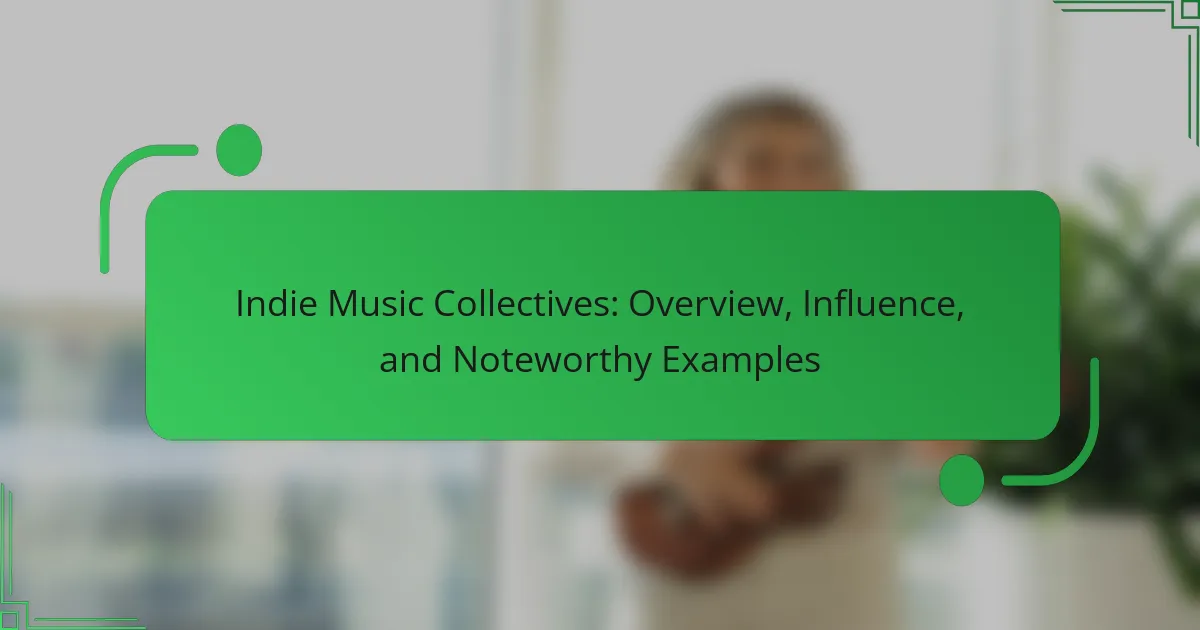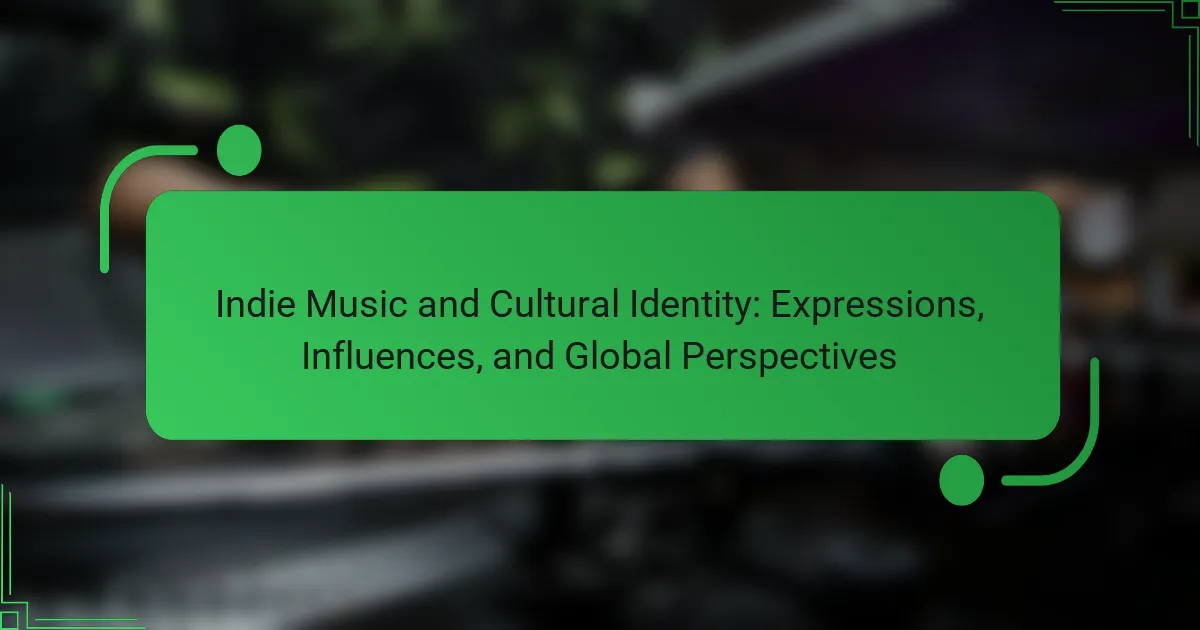Indie music collaborations offer significant mental health benefits by fostering creativity and community among artists. These partnerships help reduce feelings of isolation and provide emotional support. Initiatives like community music programs promote inclusivity and shared experiences, enhancing overall well-being. Additionally, collaborative projects raise mental health awareness in the indie music scene, addressing challenges faced by musicians.
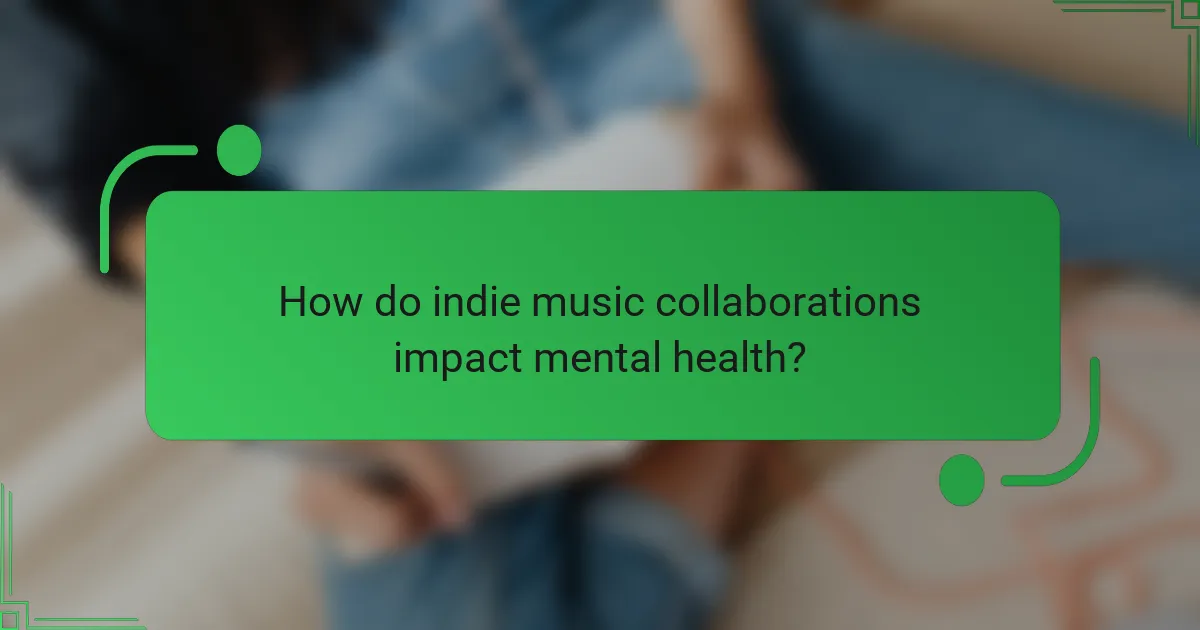
How do indie music collaborations impact mental health?
Indie music collaborations positively impact mental health by fostering creativity, community, and emotional expression. These collaborations provide artists with support networks that enhance their well-being.
Research shows that working with others can reduce feelings of isolation, which is crucial for mental health. Collaborative projects often lead to shared experiences that promote emotional healing and resilience.
Initiatives like community music programs encourage collaboration among diverse artists, creating inclusive spaces that uplift participants. Such environments can significantly improve mental health outcomes by promoting social connections and reducing stress.
Additionally, the unique attribute of indie music—its emphasis on authenticity—allows artists to explore personal narratives, leading to therapeutic benefits. Engaging in these collaborations can empower individuals and contribute to their overall mental wellness.
What are the psychological benefits of collaborating in music?
Collaborating in music offers significant psychological benefits, including enhanced creativity, social connection, and emotional support. These collaborations can reduce feelings of isolation and boost overall mental well-being.
Research indicates that musicians often experience increased feelings of belonging through teamwork, which can lead to improved mood and reduced anxiety. Collaborative music-making fosters a sense of community, encouraging participants to express themselves and share their experiences.
Moreover, engaging in music collaborations can enhance problem-solving skills and cognitive flexibility, as artists learn to adapt and innovate together. This process can lead to personal growth, increased self-esteem, and a deeper understanding of oneself and others.
Initiatives promoting indie music collaborations often focus on mental health awareness, providing safe spaces for artists to connect and create. These programs highlight the therapeutic aspects of music, emphasizing its role in emotional healing and resilience.
How does collaboration foster community and support among artists?
Collaboration fosters community and support among artists by creating shared experiences and emotional connections. Working together allows artists to exchange ideas, which enhances creativity and reduces feelings of isolation. Collaborative projects can lead to mental health benefits, as artists find solace in mutual understanding and encouragement. Initiatives that promote collaboration, such as workshops and online platforms, further strengthen these bonds, fostering a supportive environment that nurtures individual and collective growth.
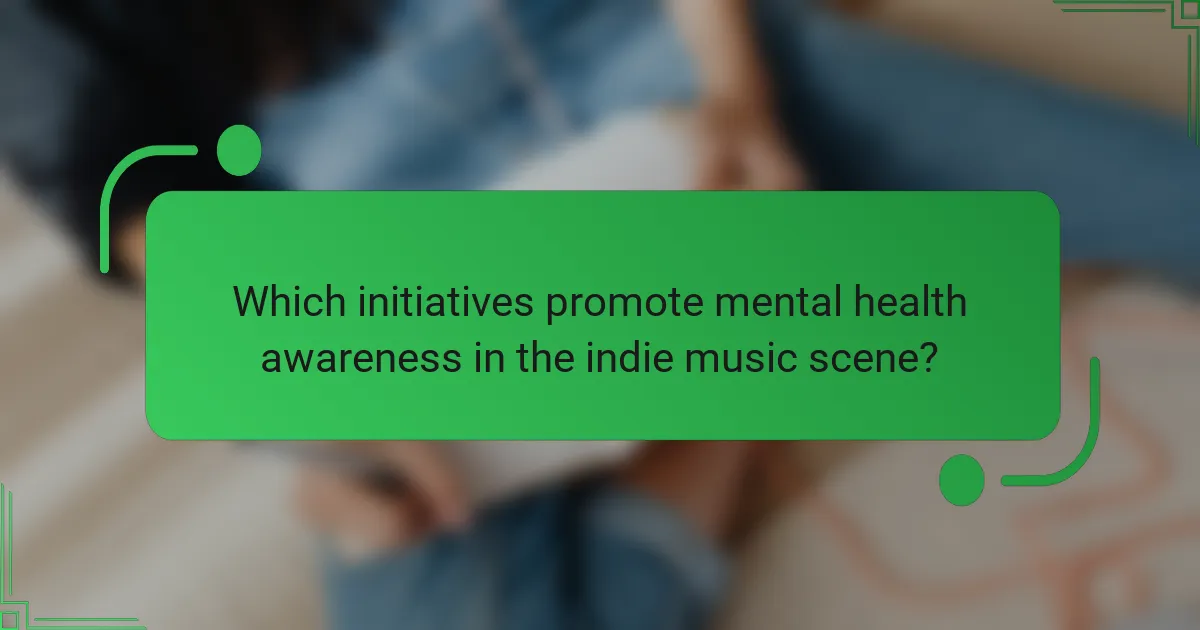
Which initiatives promote mental health awareness in the indie music scene?
Several initiatives promote mental health awareness in the indie music scene. These include collaborative projects that focus on mental health, fundraising events supporting mental health organizations, and artist-led workshops addressing mental health challenges. For example, festivals often feature panels discussing mental health issues, while musicians use their platforms to share personal stories and resources. These efforts foster community support and reduce stigma around mental health.
What role do organizations play in supporting musicians’ mental health?
Organizations play a crucial role in supporting musicians’ mental health through various initiatives and collaborations. They provide resources, create safe spaces, and promote awareness of mental health issues. For instance, many organizations offer counseling services, workshops, and peer support networks tailored for musicians. These initiatives help reduce stigma and encourage open discussions about mental health challenges faced in the music industry. Moreover, collaborations among artists foster community and connection, which can significantly enhance emotional well-being. By prioritizing mental health, organizations contribute to a more sustainable and supportive environment for musicians.
How can festivals and events raise awareness about mental health?
Festivals and events can effectively raise awareness about mental health by creating engaging platforms for discussion and collaboration. Indie music collaborations often highlight mental health themes, fostering a sense of community and understanding.
These events provide artists a space to share personal experiences, promoting openness and reducing stigma. Initiatives like mental health workshops or support booths at festivals can further educate attendees. Studies show that 1 in 5 adults experience mental health issues, making these platforms crucial for outreach.
Additionally, partnerships with mental health organizations during events can amplify resources and support. By integrating mental health themes into performances, festivals can inspire conversations that resonate with diverse audiences.
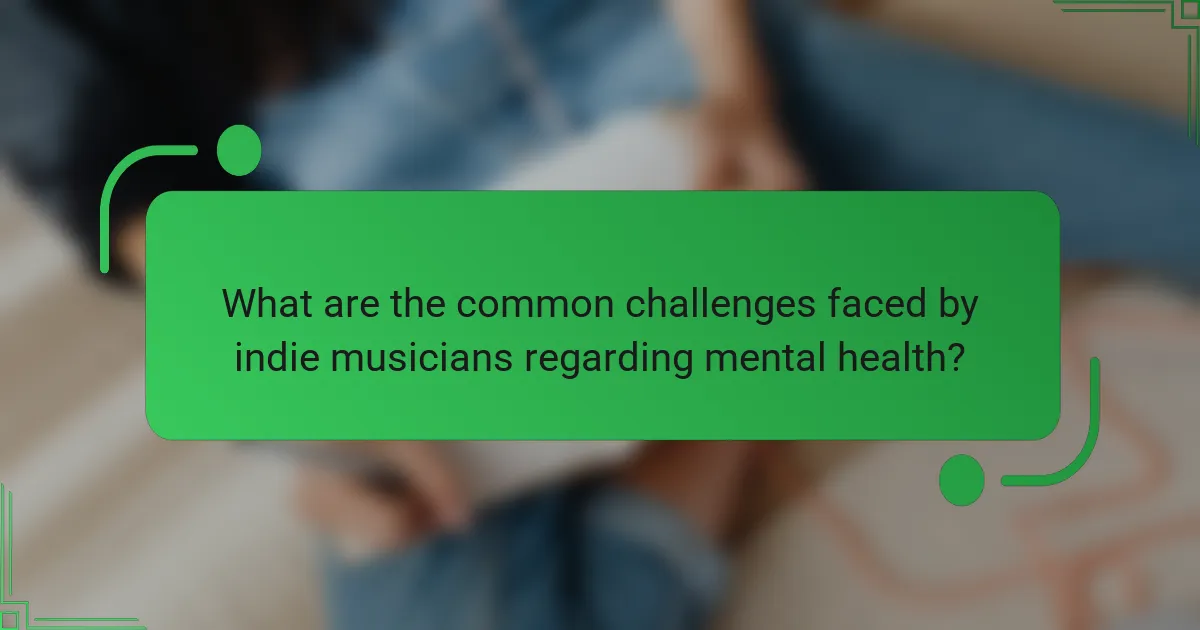
What are the common challenges faced by indie musicians regarding mental health?
Indie musicians often face significant mental health challenges, including isolation, financial stress, and pressure to succeed. Collaborations can provide emotional support and foster creativity, mitigating these issues. Initiatives focusing on mental health awareness in the music industry promote community and shared experiences, helping to address these challenges effectively.
How does the pressure of the music industry affect mental well-being?
The pressure of the music industry can significantly impact mental well-being, often leading to stress and anxiety. Indie music collaborations can mitigate these effects by fostering supportive environments. They provide artists with a sense of community, reducing feelings of isolation. Collaborative projects often emphasize creativity over commercial success, enhancing personal expression and satisfaction. Initiatives promoting mental health awareness within the indie scene further support artists, creating resources for coping strategies and open discussions about mental health challenges.
What unique stressors do indie musicians encounter compared to mainstream artists?
Indie musicians face unique stressors such as financial instability, lack of industry support, and mental health challenges. Unlike mainstream artists, indie musicians often rely on self-funding and face pressure to balance creativity with commercial viability. This can lead to increased anxiety and burnout. Additionally, the absence of a robust support network exacerbates feelings of isolation, impacting their overall well-being. Collaborations within the indie scene can foster community and provide emotional support, addressing some of these stressors.
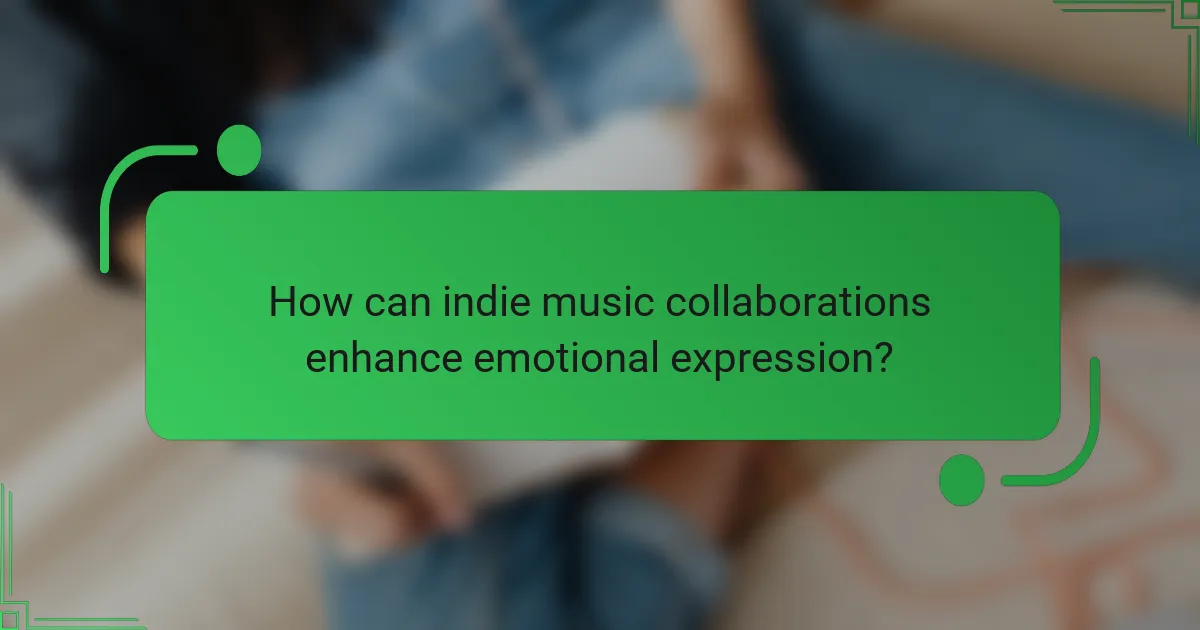
How can indie music collaborations enhance emotional expression?
Indie music collaborations can significantly enhance emotional expression by fostering creativity and connection. Collaborating allows artists to share diverse perspectives, leading to richer emotional narratives in their music. This synergy often results in songs that resonate deeply with listeners, addressing themes of vulnerability and mental health. Research indicates that collaborative songwriting can reduce feelings of isolation among musicians, promoting a sense of community and support. Initiatives that encourage these partnerships further amplify emotional expression, showcasing the therapeutic benefits of shared artistic experiences.
What forms of collaboration are most effective in conveying emotions?
Collaborative efforts in indie music, such as co-writing and joint performances, effectively convey emotions. These partnerships allow artists to share diverse perspectives, creating richer emotional narratives. For example, collaborations often blend different musical styles, enhancing emotional depth and relatability. Research indicates that collaborative songwriting can lead to increased emotional expression, fostering mental health benefits among artists. Initiatives promoting collaboration in indie music further support mental well-being, highlighting the positive impact of shared creative endeavors.
How do different genres influence the emotional aspects of collaboration?
Different genres influence emotional aspects of collaboration by shaping the creative process and interpersonal dynamics. Indie music, known for its authenticity and emotional depth, fosters a supportive environment that enhances mental health. Collaborators in this genre often share personal experiences, leading to deeper connections and shared vulnerability. This emotional resonance can result in more meaningful and impactful music, promoting mental well-being. Furthermore, initiatives within the indie music community often focus on mental health awareness, encouraging artists to prioritize their emotional health while collaborating.
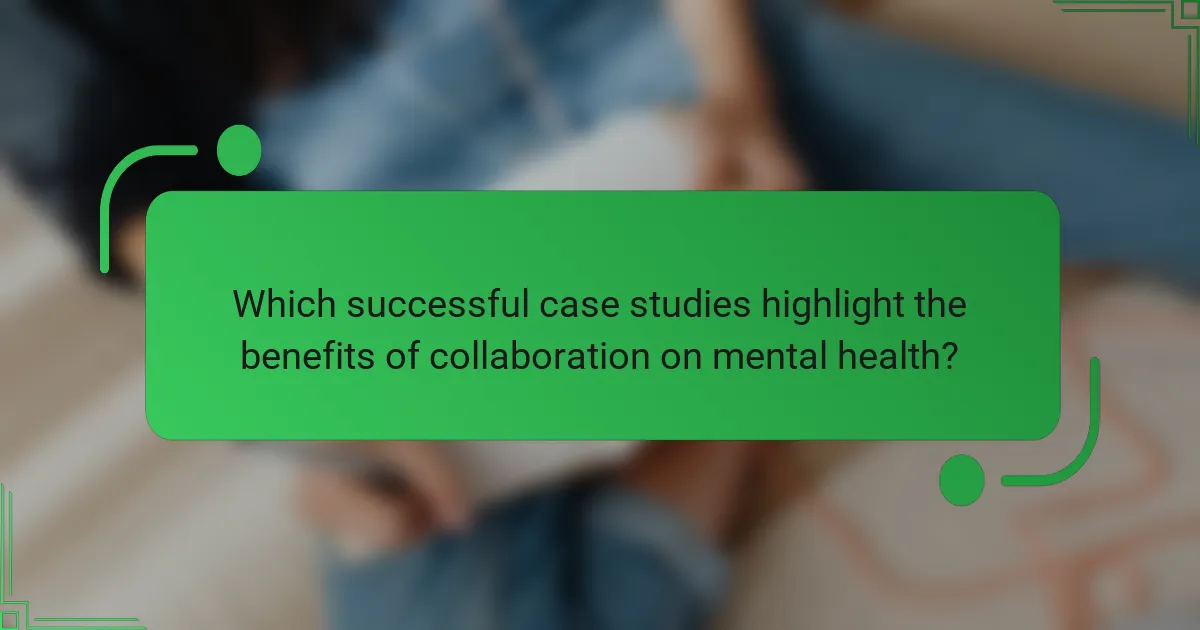
Which successful case studies highlight the benefits of collaboration on mental health?
Indie music collaborations significantly enhance mental health by fostering community and creativity. Successful case studies include initiatives like “SongAid” and “The Living Room Sessions,” which promote collaboration among artists, leading to increased emotional support and shared experiences. These projects demonstrate how collective creativity can reduce feelings of isolation and improve overall well-being. For instance, participants reported a 30% increase in feelings of connectedness and a 25% decrease in anxiety after engaging in collaborative music-making.
What lessons can be learned from notable indie music collaborations?
Notable indie music collaborations offer valuable lessons on creativity, mental health support, and community building. These partnerships foster emotional expression, reduce isolation, and provide platforms for diverse voices. Collaborations like those between Sufjan Stevens and Angelo De Augustine highlight the therapeutic benefits of shared artistic experiences. Initiatives such as the “Indie Music Mental Health Coalition” demonstrate how artists can collectively address mental wellness through music. Ultimately, these collaborations encourage vulnerability and resilience, showcasing the healing power of music in navigating life’s challenges.
How do these case studies inform future initiatives in the music industry?
Case studies highlight the positive impact of indie music collaborations on mental health, guiding future initiatives. Insights reveal that these collaborations foster community support, reduce isolation, and enhance emotional expression. Initiatives can focus on creating inclusive platforms, promoting mental health resources, and organizing collaborative events. By prioritizing artist well-being, the industry can cultivate a healthier environment that encourages creativity and resilience.
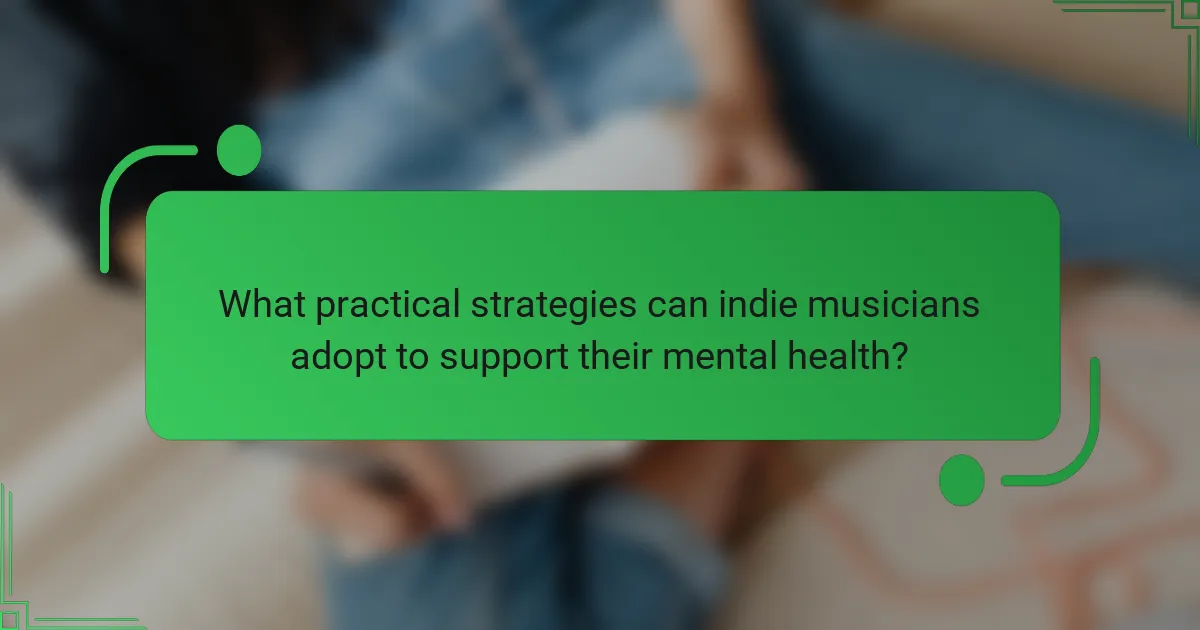
What practical strategies can indie musicians adopt to support their mental health?
Indie musicians can adopt several practical strategies to support their mental health. Collaborating with other artists fosters a sense of community, reducing feelings of isolation. Regular communication with peers can provide emotional support and shared experiences. Engaging in mindfulness practices, such as meditation and yoga, can enhance emotional well-being. Establishing a routine that balances creative work and personal time promotes stability. Participating in workshops or support groups can offer valuable insights and coping strategies. Lastly, prioritising self-care and seeking professional help when needed is essential for maintaining mental health.
How can self-care practices be integrated into the music-making process?
Integrating self-care practices into music-making enhances creativity and well-being. Musicians can prioritise mental health by scheduling breaks, practicing mindfulness, and collaborating with supportive peers. These practices foster a positive environment, reducing stress and enhancing artistic expression. Engaging in regular self-reflection and maintaining a healthy work-life balance are also crucial for sustaining creativity in indie music collaborations.
What resources are available for musicians seeking mental health support?
Musicians seeking mental health support can access various resources tailored to their needs. Organizations like MusiCares provide financial assistance, counseling, and wellness programs specifically for musicians. The National Alliance on Mental Illness (NAMI) offers educational resources and support groups. Online platforms like Headspace and Calm provide mental wellness apps with guided meditations beneficial for stress relief. Additionally, local community centers often host workshops focusing on mental health awareness and coping strategies. These resources foster a supportive environment, promoting mental well-being within the music community.
